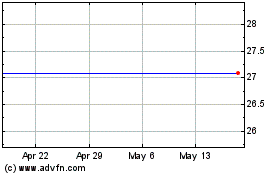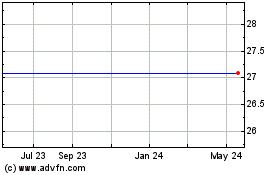By Jing Yang and Xie Yu
No stock has been more heavily attacked by activist short
sellers this year than GSX Techedu Inc., a New York-listed Chinese
tutoring company.
So far, GSX has come out on top. After quintupling this year, it
is one of the world's most valuable education businesses, with a
market capitalization of $27.3 billion.
"Shorting this, it has been just a nightmare," said Richard
Smatt, a mathematics professor at Flagler College in St. Augustine,
Fla., who said he is sitting on tens of thousands of dollars in
unrealized losses on GSX.
Short sellers have made killings on stocks such as Nikola Corp.
and Luckin Coffee Inc. But in these volatile and speculative
markets, the playbook has also flopped. Despite more than a dozen
scathing research reports that have accused GSX of inflating its
revenue and other questionable practices--allegations that sparked
an investigation by the U.S. Securities and Exchange
Commission--losses have mounted for investors who have bet against
the six-year-old company.
GSX is one of the worst-performing bets for short sellers
globally this year, as measured by the stock's performance since
the first short-seller report against the company was released in
February, according to Breakout Point, a research service. Bearish
investors also have suffered heavy losses betting against Tesla
Inc., whose stock is now worth more than five times what it was at
the start of the year.
Just 16 months ago, Beijing-based GSX was valued at $2.5 billion
after completing a $216 million initial public offering on the New
York Stock Exchange. The company provides after-school online
tutoring to elementary-to-high-school students all over China, as
well as professional training for adults in subjects such as
finance and education, and has reported triple-digit revenue growth
since 2017. GSX says it collects course fees from students, who
attend live lectures in large classes or receive tutoring in
smaller groups in mathematics, foreign languages and other
subjects.
Online education has been a rapidly growing sector in China, and
other education stocks have climbed this year as the coronavirus
pandemic helped make a bigger case for remote learning. GSX's
gains, however, have far exceeded those of its peers. Some
investors say this has been the result of a "short squeeze," in
which short sellers have been forced to buy back shares to close
out their losing bets, pushing prices sharply higher in the
process. In June, as much as 33% of GSX's shares had been sold
short, according to S3 Partners, excluding the supervoting shares
owned by the company's founder.
In the first six months of 2020, GSX reported revenue of 2.95
billion yuan, equivalent to $434 million, a more than fourfold
increase from the same period a year ago. It posted first-half net
income of 167 million yuan, or $24.6 million.
"The numbers are just too good to be true," said Siegfried
Eggert, who runs New York-based Grizzly Research, the first firm to
publicly question GSX's reported results. High-profile short
sellers, including Carson Block of Muddy Waters Research and Andrew
Left of Citron Research, have drawn similar conclusions and
released reports accusing the company of fabricating revenue by
populating its online classrooms with fake students.
Their research has drawn like-minded investors, who have banded
together on Twitter to criticize GSX and share strategies in the
hope of profiting from stock-price declines. Members of the group
have repeatedly sent emails to the SEC, U.S. politicians and GSX's
auditor, Deloitte, pleading with them to act. Some short sellers
have encouraged journalists to investigate the company and asked
Chinese regulators to look into its practices.
It is rare for a company to be attacked the way GSX has been,
said Gillem Tulloch, founder of Hong Kong-based investment-research
firm GMT Research, adding, "I've almost never seen anything like
this."
GSX has steadfastly denied allegations of fraud and defended its
business. The company said last month that the SEC's enforcement
division has asked it to produce financial and operating records
dating back to the beginning of 2017. Its shares initially declined
before returning to levels they were at before the company
disclosed the investigation.
Shannon Shen, the company's chief financial officer, said GSX
began an internal investigation before the SEC's probe. She said
the internal investigation is being conducted by a U.S.-based law
firm and a major accounting firm that isn't Deloitte, but declined
to reveal their names.
"We have turned over our phones, laptops and the company's hard
drives to cooperate with the internal investigation," she said. "It
is not a comfortable process, but no investigation with integrity
is comfortable."
Ms. Shen also said that since May, some GSX employees have
received phone calls from anonymous people. "A lot of our
executives, colleagues and investors have been harassed," she said,
adding that she received three calls in which people speaking in
Mandarin threatened to put her in jail.
More than a dozen short sellers and GSX investors said they had
no knowledge of such calls. "That's not cool. That's not the right
way to be," said Mr. Eggert, of Grizzly Research. "If you try to be
on the right side of the battle, you also have to behave in such
ways," he said.
Short sellers have previously targeted stocks of other Chinese
education companies, including TAL Education Group and New Oriental
Education & Technology Group Inc. Earlier this year, New
York-listed TAL said it discovered that an employee had wrongly
inflated some sales in a new business that accounted for 3% to 4%
of its revenue for its fiscal year that ended in February. Its
shares initially fell but are now up nearly 65% in the year to
date.
Wang Qiang, founder and chairman of Hong Kong-based hedge-fund
manager Pinpoint Asset Management, said his firm purchased GSX's
American depositary receipts earlier this year and sold them
gradually as the shares climbed, cashing out completely by August,
after they had multiplied in value. He said he scrutinized the
company closely and wasn't bothered much by short sellers'
reports.
"Foreigners might not understand GSX. They do not understand how
much Chinese parents are willing to spend on the education of their
kids," Mr. Wang said.
Others are nursing their wounds. Tom Forrest, a Hong Kong-based
individual investor and novice short seller, borrowed GSX shares in
May and sold them, and is sitting on tens of thousands of dollars
in losses. "I naively thought it'd be a straightforward process"
after Luckin's downfall, said the 42-year-old, who works as a
consultant and published two reports on GSX under the name Sylvan
Research.
Xu Weikang, a 28-year-old software engineer in Beijing, is in
the same boat. A company he co-owns called Scorpio VC has released
four research reports on GSX and lost half of the roughly $160,000
it was betting against the company. It closed out its short
position in August when the stock hit a record, but recently bet
against the company again following news of the SEC
investigation.
"We can only count on the SEC now. I still believe GSX is
problematic," Mr. Xu said.
Write to Jing Yang at Jing.Yang@wsj.com and Xie Yu at
Yu.Xie@wsj.com
(END) Dow Jones Newswires
October 12, 2020 05:53 ET (09:53 GMT)
Copyright (c) 2020 Dow Jones & Company, Inc.
GSX Techedu (NYSE:GSX)
Historical Stock Chart
From Jan 2025 to Feb 2025

GSX Techedu (NYSE:GSX)
Historical Stock Chart
From Feb 2024 to Feb 2025
